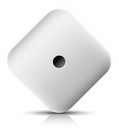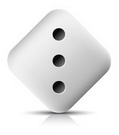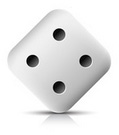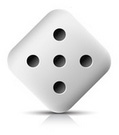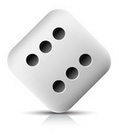Roll a D100 die and a D100 die
D100 + D100 Dice Roller
- D100 + D100 Dice Roller
- Rolls a D100 die and a D100 die
- Lets you roll multiple dice like 2 D100s, or 3 D100s. Add, remove or set numbers of dice to roll
- Combine with other types of dice (like D98 and D102) to throw and make a custom dice roll
- Roll the dice multiple times. You can choose to see only the last roll of dice
- Display sum/total of the dice thrown. You can choose to see totals only
Statistics of this Dice Roller
- RollD100 + D100
- Total Kinds of Dice1
- Total Dice2
- Minimum Sum2
- Maximum Sum200
- Lowest Dice Face1
- Highest Dice Face100
- Highest Dice Face of the Smallest Die100
-
D100 + D100
Total Possible Combinations 5,050
Number of combinations are calculated using the formula [ (100+2-1) choose (2) ]
You can try generating all the combinations using the following combination generator
All possible combinations of 2D100 -
D100 + D100
Total Possible Permutations 10,000
Number of permutations are calculated using the formula [ 100^2 ]
You can try generating all the permutations using the following permutations generator
All possible permutations of 2D100
Probabilities of this Dice Roller
D100 + D100
Probability of getting a 1
In technical terms this is equivalent of getting atleast one 1. This is close to 0.02, about 1.99% percent.This is calculated by multiplying all the probabilities of not getting a 1 for each dice and then subtracting the answer from 1.
1 - (99/100 x 99/100)
Probability of not getting a 1
Probability of not getting any 1 is close to 0.98, about 98.01% percent.This is calculated by multiplying all the probabilities of not getting a 1 for each dice.
99/100 x 99/100
Probability of getting all 1's
Probability of getting all 1's is close to 0.0001, about 0.01% percent.
This is calculated by multiplying together all the probabilities of getting a 1 for each dice.
1/100 x 1/100
Probability of getting 2 1s
Probability of getting 2 1's is close to 0.0001, about 0.01% percent.
This is calculated by multiplying together all the probabilities of getting a 1 for each dice that has a 1.
1/100 x 1/100
Probability of getting a 100
In technical terms this is equivalent of getting atleast one 100. This is close to 0.02, about 1.99% percent.This is calculated by multiplying all the probabilities of not getting a 100 for each dice and then subtracting the answer from 1.
1 - (99/100 x 99/100)
Probability of not getting a 100
Probability of not getting any 100 is close to 0.98, about 98.01% percent.This is calculated by multiplying all the probabilities of not getting a 100 for each dice.
99/100 x 99/100
Probability of getting all 100's
Probability of getting all 100's is close to 0.0001, about 0.01% percent.
This is calculated by multiplying together all the probabilities of getting a 100 for each dice.
1/100 x 1/100
Probability of getting 2 100s
Probability of getting 2 100's is close to 0.0001, about 0.01% percent.
This is calculated by multiplying together all the probabilities of getting a 100 for each dice that has a 100.
1/100 x 1/100
Probability of getting all highest faces
Probability of getting all the maximum faces (2 100's) is close to 0.0001, about 0.01% percent.
This is calculated by multiplying together all the probabilities of getting the maximum face for each dice.
1/100 x 1/100
Probability of getting one of a kind
Probability of getting one of a kind is close to 0.01, about 1% percent.
There are 100 ways to get one of a kind (all 1's, all 2's, all 3's, all 4's, all 5's, all 6's, all 7's, all 8's, all 9's, all 10's, all 11's, all 12's, all 13's, all 14's, all 15's, all 16's, all 17's, all 18's, all 19's or all 20's and so on). The probability of getting all of any kind is then caclulated by adding the probability of getting all 1's, all 2's, all 3's, all 4's, all 5's, all 6's, all 7's, all 8's, all 9's, all 10's, all 11's, all 12's, all 13's, all 14's, all 15's, all 16's, all 17's, all 18's, all 19's or all 20's and so on. Since, probabilities of getting all 1's through all 100's are the same, we can multiply them all together. So, multiplying the probability of getting all 1's by 100 will give us the probability of getting all of any kind.
100 x (1/100 x 1/100)
Javascript code to create this dice roller
// code to create a D100 + D100 dice roller
// define the sets of dice to use
// 1 set for each kind of dice
var dice_sets = [
[1, 100], // 1d100
[1, 100], // 1d100
];
var this_roll = []; // array to store the results of this roll
for (var ds = 0; ds < dice_sets.length; ds++) {
//loop through each dice set
// for each dice set, determine the numbers of dice, lowest and highest side of the dice
var numbers_of_dice = dice_sets[ds][0]; // how many dice to roll
var lowest = 1; // lowest possible side of the dice
var highest = dice_sets[ds][1]; // highest possible side of the dice
for (var j = 1; j <= numbers_of_dice; j++) {
// loop for the number of dice
// for each dice, generate a number between lowest and highest
var dice_face = Math.floor(Math.random() * (highest-lowest+1) + lowest);
this_roll.push(dice_face); //store this in the array
}
}
// print all the generated rolls
for (j = 0; j < this_roll.length; j++) {
// loop through the inner dice array
//print each dice roll value followed by a space
document.write(this_roll[j]);
document.write(" ");
}
/*
Sample output
*/
